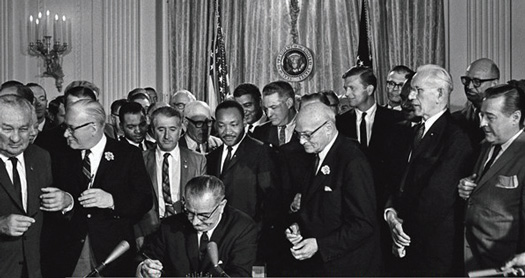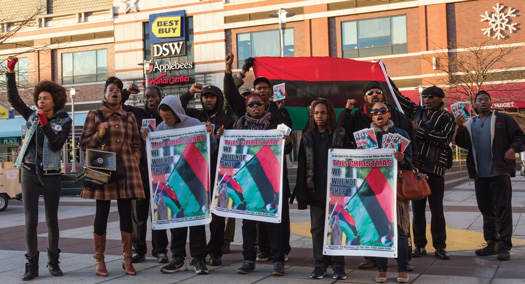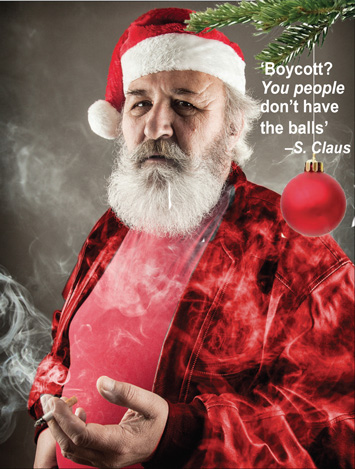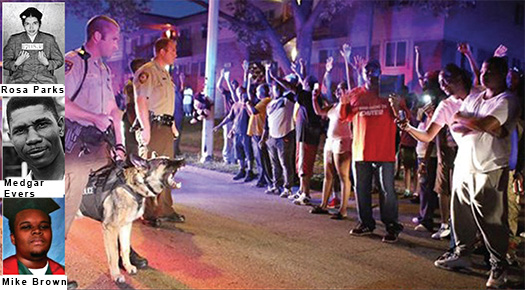The powerful history of Black boycotts
By Charlene Muhammad -National Correspondent- | Last updated: Nov 25, 2015 - 8:59:59 AMWhat's your opinion on this article?

Only after a major bus boycott and the murder of many Blacks and civil rights activists, including Medgar Evers, President Lyndon Johnson signed the first and last Civil Rights act into law in 1964. Photo: MGN Online
|

Protesters in Brooklyn, N.Y. show their support for the spending boycott. Posters read, “This Christmas we will not shop.”
|
When Nation of Islam Minister Louis Farrakhan declared that the Justice Or Else! movement would wage an economic boycott to redistribute the pain Blacks suffer in America, many understood and moved out on his call. Others wondered, could a Christmas spending boycott benefit Black people?
A look at historical boycotts reveals just how important this tool has been in pressing for social and economic reform and how far back the idea goes.

Money is the language of Justice in America. Photo: Bigstock.com
|
Throughout history, other notable Black luminaries like the late Ida B. Wells, congressman and activist Adam Clayton Powell, Jr., singer and actress Odetta Gordon and author John Killens were also on the front lines. Min. Farrakhan spoke of their great contributions in boycott movements in the face of vehement opposition from Whites.
Min. Farrakhan explained that Fredrick Douglass, the great abolitionist, freedom fighter and former slave spoke against the celebratory practices and foolishness many of these holidays represent. Holidays, especially Christmas were used to distract Black slaves. Blacks were happy because they were given the day off by the slave master and were allowed to “have fun” by playing trivial games. Slaves were allowed and often encouraged to use holidays as a time to get drunk, said Mr. Douglass.
“For when he was alive among us, he condemned all the holidays of the White man as nothing but a trick and a tool to keep our people from insurrection,” said Min. Farrakhan of Mr. Douglass. Every holiday of the White man involves alcohol, games of chance (gambling) and sport and play, the Minister continued. “That’s the way we’ve been trained we act.”
“It’s not honoring Jesus. We want to bring honor back to Jesus and take Santa and this commercial madness and put it where it belongs, in the garbage pail of history,” said Min. Farrakhan, reflecting the direct line and path of his teacher, the Honorable Elijah Muhammad.
In his seminal book, Message to the Black Man in America, Mr. Muhammad wrote there is no holiday of White people that Black people should worship as their day. Jesus has been “garbed up and commercialized,” he explained.
“All of these things, especially intoxicating liquors and the eating of swine flesh and drunkenness, dancing, and gambling, are done on the day that they commemorate for a man that they claim to have been a most perfect man; holy, righteous, the son of God. There is no holy worship on that day for him,” wrote Mr. Muhammad.
Famed journalist Ida B. Wells, also born a slave, started a boycott of White businesses with the help of others in Memphis in response to the mass lynchings of Blacks taking place in that city in the late 1890s. She was threatened by Whites because of her efforts. She was also criticized by upper class Blacks.
“How many of us know about Ida B. Wells? The woman was something! She organized a boycott. They told her they were going to kill her. She took her gun and put it under her pillow. She said if somebody comes, I may go but I’m taking somebody down with me. Don’t you want to know about these people that wanted to boycott?” said Min. Farrakhan.
Consider the 1963 economic boycott of Christmas conceived of by Dr. Martin Luther King, Jr. The civil rights leader desired to honor those who lost their lives that year in the freedom struggle—and inflict some pain on those who failed to give justice to Black people.
The boycott was initially the idea of James Baldwin, Louis Lomax, Actors and Writers for Justice as well as legendary writer Langston Hughes, according to Dr. Ava Muhammad, national spokesperson for Minister Farrakhan.
Among Blacks killed that year were six children, including four teenaged girls—Addie Mae Collins, Denise McNair, Carole Robertson, and Cynthia Wesley—murdered Sept. 15, 1963 when Ku Klux Klansmen bombed Birmingham’s 16th Street Baptist Church. The tally also included civil rights leader Medgar Evers, who was assassinated in his driveway with his wife and children at his home, noted Dr. Muhammad, who is also a lawyer.

Blacks in America the past year have endured attack dogs, rubber bullets and heavy military armor ... after over 50 years since the passing of the Civil Rights bill many observers say the treatment of Blacks has actually gotten worse in America. The Honorable Minister Louis Farrakhan has asked that Blacks, in accordance with the words of Dr. Martin Luther King, withdraw their economic support through boycott, to ‘redistribute the pain’, until justice is issued. (Inset photos, from top) Rosa Parks, Edgar Evers and Michael Brown. Photos: MGN Online/Wickipedia
|
Despite widespread support, resistance from a leading organization thwarted efforts for a national boycott, she said.
However in Jackson, Miss., which had activists and youth engaged in demonstrations and protests and with Mr. Evers’ earlier boycott campaigns, economic withdrawal proved successful. By time the Civil Rights Act of 1964 was coming to the fore, White merchants and businesses were ready to end overt segregation.
“At that time a White marketing research firm in New York stated that their studies showed that upward of 90 percent of Black people were ready to take part. I believe that this is the time now of the fulfillment of the desire of Dr. King and other people who were sincerely attempting to move our people forward,” Student Minister Muhammad stated.
“They understood, Dr. King understood insofar as that aspect of the teachings of the Honorable Elijah Muhammad, that without economic self-sufficiency, we have no leverage,” she continued.
That leverage can be restored through boycotts, referred to during the civil rights movement as selective buying, said Charles Steele, president of the Southern Christian Leadership Conference.
In the past, civil rights leaders had to use the term selective buying because of the lawsuits their organizations, SCLC, the NAACP, and others encountered, he explained.
“Today it’s something that we don’t use enough in terms of the power of African American people who have been disenfranchised within the system. This is something that collectively we need to get more involved in because had it not been for the boycotts, selective buying in the 50s, and the 60s as well as the early 70s we would not have accomplished many of the successes that we have today,” he told The Final Call.
Mr. Steele noted that the civil rights boycotts influenced the South African anti-apartheid movement, divestment and other economic boycotts.
“First of all in South Africa, they patterned themselves from SCLC, NAACP and other civil rights organizations. That’s what motivated them, so when you talk about South Africa, they got the ultimate of what we got,” he stated.
South Africa got President Nelson Mandela, and America got President Barack Obama, but voting rights were won through struggle and a strategy, he said. The struggle opened the way for President Obama and President Mandela, he said.
“The civil rights movement that we know of today from the 50s and the 60s, and America set the cadence of liberation and the freedom and justice for all God’s children all over the world. So you can’t talk about South Africa without talking about the 1960s as well as the 60s in America,” Mr. Steele told The Final Call.
As Blacks withdraw their economic support from America, they must simultaneously build more Black businesses, he stressed. As a child he could point to Black-owned hotels, restaurants, pool halls, taxi cab stands, all sorts of shoe shops. Today, Blacks don’t even have a fraction of those things and none in his community in Tuscaloosa, Ala., Mr. Steele said. He blamed integration without a strong focus on economics.
“Dr. King realized this very late in the civil rights movement, just before he was assassinated. He realized that he brought about in 1964 a civil rights bill; he brought about a 1965 Voters Rights Act, but at the end, just about a year or so before he was assassinated, he realized the economics were left out of the plan … . He realized if you are talking about love, you’ve got to have all of those entities in terms of freedom, justice, equality, economic development, and we didn’t negotiate that,” Mr. Steele said.
Blacks must use their $1.3 trillion buying power to benefit themselves in a real way activists and advocates said.
A huge percentage of that buying power is spent during the so-called Christmas holiday season, observed Student Minister Muhammad.
“Minister Farrakhan is saying that in the efforts of receiving any justice whatsoever from this legal and political system in this country, we now have to stand up and be proactive in securing this for ourselves. The first and most effective way in doing that is to withdraw the money we spend in the so-called Christmas holiday,” she said.
According to the National Retail Federation, Black Friday and Cyber Monday spending sales, a four-day weekend, dropped 11 percent last year to $50.9 billion from $57.4 billion in 2013. The federation blamed fewer online shoppers for the decline, but Black protestors shut down malls, shopping centers and businesses last year as part of demonstrations against police brutality, the killing of Black teenager Mike Brown in Ferguson, Mo., and the failure to charge the officer involved with a crime.
The national Justice Or Else! boycott aims to put a dent in sales this year.
Blacks need the relief experienced by giving back the pain they have received, Ava Muhammad said. There’s no doubt retailers will feel the pain if some Blacks boycott because Blacks spend more on shopping and retailers count on those disproportionate shopping dollars, she said.
“No one is suggesting to our people that you never go in a store again in life. What we are talking about is a targeted time frame, nothing to do with the birth of Jesus. Step away from that. It will have an effect,” she said.
The 1963 Christmas boycott or selective buying campaign in Jackson, Miss. certainly did, according to writings in a January 16, 1964 edition of Jet magazine. It slowed business, forced two firms out of business and cancellation of Jackson’s annual Christmas parade. People ignored then Mayor Allen Thompson’s pleas for Negroes to shop downtown again under protection.
“The widow of Medgar Evers was so overwhelmed with it, because she said we didn’t even have Christmas lights up. We did nothing to acknowledge that holiday,” Dr. Muhammad said.
“If our people are being sensitive to the incredible loss of life that we have suffered at the hands of law enforcement—state-sponsored murders of our people—if you are anyway as a Black person, sensitive to that fact, concerned with that reality, then you have to ask yourself, am I willing to at least withhold my dollars?”
“No one is asking you to go out and engage in anything. What we are asking you to do is to stay home and not purchase any non-essentials during this time, but with particular interest on the first day, the so-called Black Friday. Minister Farrakhan wants those retail stores to be ghost towns, and the overwhelming success of 10-10-15 indicates that just as in 1963 our people were ready, I believe that in 2015 we are ready.”
As Jarim Person Lynn, an L.A.-based author and wealth coach put it, boycotting has always been Blacks’ third attempt at getting their voices heard.
“The first attempts are speaking out against injustices, while simultaneously attempting to negotiate directly with local officials and politicians for laws to be changed,” Mr. Person Lynn said.
“We boycott as a next to last resort and as far as I am concerned, we make every attempt not to do so in the first place. But once we’ve been backed into a corner, this very powerful wake up call to the powers that be, can actually do wonders in getting grievances of a people heard. Few things shout louder in business than a financial loss—small, medium or large,” he continued. If boycotts fail, then riots and violence may follow, he said.
Riots and violence have already preceded the Justice Or Else! national boycott.
Student Minister Muhammad has been on a national tour, with the theme a “Sacrificial Christmas,” the name inspired by Dr. King. We are not mocking our Christian brothers, this is something that is important, she said.
Dr. Muhammad plans to continue the tour beyond the day after Thanksgiving. “I don’t want our people to think ‘well as long as I don’t go on Black Friday, now I can go back to what I was doing,’ we don’t want that to happen,” she said.
The 1955 Montgomery Bus Boycott against segregation on the city’s public transit system was a highly successful targeted campaign, as well as the Cesar Chavez and the United Farm Workers Association-led boycott on specific liquor companies and table grape producers, said Mr. Person Lynn.
“The protestors knew the value they had in the patronizing of those businesses versus others where they were not as economically strong. It’s a form of measurable progress,” he said.
“To showcase that progress, there has to be a larger reason to carry this boycott into longer shelf life. I propose this be to ‘Boycott Brokeness’ in general. We should be just as tired of struggling financially as we are with gang violence and the subject at hand, police brutality.”
INSIDE STORIES AND REVIEWS
-
-
About Harriett ... and the Negro Hollywood Road Show
By Rabiah Muhammad, Guest Columnist » Full Story -
Skepticism greets Jay-Z, NFL talk of inspiring change
By Bryan 18X Crawford and Richard B. Muhammad The Final Call Newspaper @TheFinalCall » Full Story -
The painful problem of Black girls and suicide
By Charlene Muhammad -National Correspondent- » Full Story -
Exploitation of Innocence - Report: Perceptions, policies hurting Black girls
By Charlene Muhammad -National Correspondent- » Full Story -
Big Ballin: Big ideas fuel a father’s Big Baller Brand and brash business sense
By Bryan Crawford -Contributing Writer- » Full Story






 Click Here Stay Connected!
Click Here Stay Connected!








